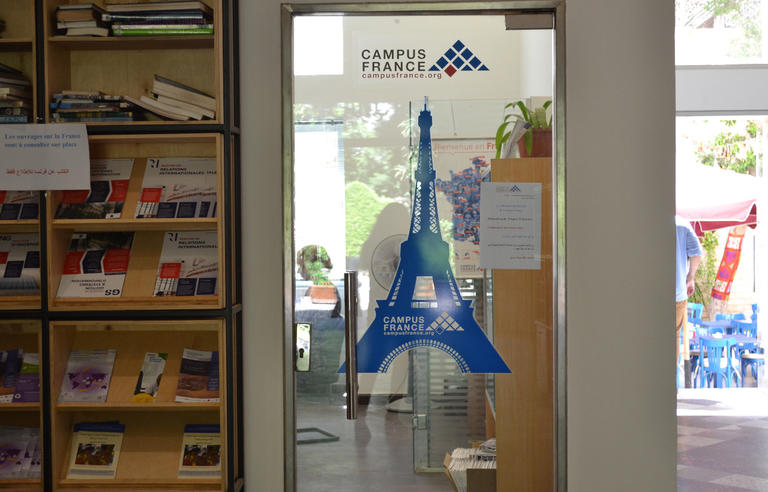
QUESTIONS REGARDING THE DIFFERENTIATED TUITION FEES? READ THE CHOOSE FRANCE FAQ
On 19 November 2018, Prime Minister Edouard Philippe introduced “Bienvenue en France,” his administration’s plan to make France more attractive to internationally mobile students. International students should know that they will be subject to higher tuition rates under the plan. The information presented here, which is based on the government’s announcements, is intended to allow students to make their study decisions under the best possible conditions. Formal regulations governing the plan are due to be published in France’s Journal Officiel.
AUTOUR DU PAIEMENT DES DROITS D’INSCRIPTION ET DES CONDITIONS D’EXONÉRATION DE CES DROITS
L’augmentation des droits d’inscription pour certains étudiants étrangers sera-t-elle effective dès septembre 2019 ?
A ce stade, il est prévu que des droits d’inscription différenciés (par rapport aux droits acquittés par les étudiants français) soient applicables dès la rentrée universitaire 2019 pour certains étudiants internationaux :
- ne seront pas concernés les étudiants déjà présents dans l'enseignement supérieur français et les ressortissants de l’Union européenne, de l’Espace économique européen, d’Andorre, de la Suisse ou d’un Etat ayant conclu un accord international avec la France le prévoyant.
- seront concernés les étudiants internationaux (hors cas déjà mentionnés) qui s'inscrivent pour la première fois dans un cycle d'enseignement supérieur (première inscription en Licence, Master ou Doctorat).
Les étudiants internationaux d’ores et déjà présents dans l’enseignement supérieur en France au cours de l’année universitaire 2018/2019 ne seront pas concernés par les droits d’inscription différenciés. Par l’effet combiné du cadre national prévu par le Gouvernement et des décisions d’exonération prises par les établissements, ils continueront à acquitter les mêmes droits que les étudiants français et européens.
Dès la rentrée 2019, sera également prévu le triplement du nombre de bourses et exonérations, accordées par le Gouvernement français (bourses du Gouvernement français, bourses Eiffel, exonérations « Bienvenue en France » / Choose France, etc.) ou par les universités et grandes écoles.
Ces bourses et exonérations pourront notamment être accordées par les établissements d’enseignement supérieur, afin de permettre aux étudiants qui terminent un cycle cette année de poursuivre leurs études dans un autre cycle l’an prochain.
Les étrangers résidant en France seront-ils concernés par le paiement de droits d’inscription différenciés ?
Les étudiants internationaux qui ont le statut de résidents en France ou dans un Etat de l’Union européenne ne seront pas concernés par le paiement de droits d’inscription différenciés. Ils continueront à acquitter des droits d’inscription identiques à ceux des étudiants ressortissants d’un pays membre de l’UE.
Il en va de même des étudiants étrangers qui résident en France et qui bénéficient d’un titre séjour portant la mention « vie privée et familiale ».
Les ressortissants de pays ayant entamé une procédure d’adhésion à l’Union Européenne (Serbie, Monténégro, mais aussi Turquie) seront-ils concernés par le paiement de droits d’inscription différenciés ?
Les étudiants ressortissants de pays qui ne sont pas encore membres de l’Union européenne ou de l’Espace économique européen seront concernés par la mise en place des frais différenciés à la rentrée 2019.
Les boursiers du Gouvernement français (BGF) seront-ils exonérés ? Auront-ils accès prioritairement aux prestations des CROUS ?
Oui, les boursiers du Gouvernement français, tout comme tous les bénéficiaires d’une bourse d’enseignement supérieur accordée par l’Etat, sont et resteront exonérés des droits de scolaritélorsqu’ils s’inscriront dans une formation qui délivre un diplôme national. Ils accéderont prioritairement à un contingent dédié de logements gérés par les CROUS, tout comme l’ensemble des boursiers internationaux.
Les boursiers de gouvernements étrangers, de fondations… seront-ils concernés par le paiement de droits d’inscription différenciés ?
Les bourses allouées aux étudiants par les Gouvernements étrangers (BGE) n’entraineront pas, comme c’est le cas actuellement, l’exonération de droits d’inscription pour s’inscrire dans les établissements d’enseignement supérieur français.
Néanmoins, les BGE qui bénéficient d’un cofinancement du poste (bourses de couverture sociale en particulier) seront assimilées à des bourses du Gouvernement Français. Les étudiants concernés par ce dispositif seront alors exonérés du paiement de droits d’inscription.
Les étudiants déjà inscrits dans une formation de FLE (français langue étrangère) en préparation d’une entrée en licence, master ou doctorat seront-ils concernés par le paiement de droits d’inscription différenciés ?
Les étudiants internationaux (en dehors des cas déjà mentionnés) qui sont actuellement inscrits dans une formation préparatoire à l’entrée dans un cycle de formation (Licence, Master ou Doctorat) et qui s’inscriront pour la première fois dans ce cycle à la rentrée universitaire 2019 pourront bénéficier d’une exonération du paiement de droits d’inscription accordée par l’université ou l’école où ils seront inscrits.
Les étudiants ayant passé un baccalauréat français ou ayant suivi leur scolarité dans un lycée français à l’étranger seront-ils concernés par le paiement de droits d’inscription différenciés ?
Les étudiants internationaux (en dehors des cas déjà mentionnés) qui ont obtenu un baccalauréat français à l’étranger ou étudié dans un lycée français à l’étranger devront s’acquitter des droits d’inscription différenciés.
En revanche, ceux qui ont passé le baccalauréat en France et qui ont le statut de résidents de l’Union européenne (UE) ou qui sont présents en France et détenteurs d’un titre de séjour portant la mention « vie privée et familiale » continueront à acquitter des droits d’inscription identiques à ceux des étudiants ressortissants d’un pays membre de l’UE.
Les étudiants internationaux inscrits en BTS ou en classes préparatoires aux grandes écoles (CPGE) devront-ils s’acquitter des droits d’inscription différenciés ?
Les étudiants internationaux (en dehors des cas déjà mentionnés) qui s’inscriront ou poursuivront leurs études, à la rentrée 2019, en section de technicien supérieur (STS) ou en classe préparatoire aux grandes écoles (CPGE) dans un établissement public n’acquitteront pas de droits d’inscription différenciés.
Toutefois, les étudiants internationaux inscrits en classe préparatoire qui s’inscriront en parallèle pour la première fois à l’université à la rentrée 2019, afin de bénéficier notamment des équivalences et possibilités de poursuite d’études, seront concernés par le paiement des droits d’inscription différenciés.
Les universités pourront prévoir, dans le cadre de leur politique d’accueil et d’attractivité, une exonération totale ou partielle spécifique du paiement des droits d’inscription en faveur de ces étudiants en double inscription.
Les étudiants internationaux inscrits à la préparation d’un diplôme universitaire de technologie (DUT) ou en école interne d’ingénieur devront-ils s’acquitter des droits d’inscription différenciés ?
Les étudiants internationaux (en dehors des cas déjà mentionnés) inscrits dans les formations universitaires délivrant des diplômes nationaux devront s’acquitter des droits d’inscription différenciés. C’est le cas des étudiants s’inscrivant à la préparation d’un DUT ou à des diplômes d’ingénieur délivrés par les écoles et instituts internes au sein des universités.
Quel est le montant des droits d’inscription dont devront s’acquitter les étudiants inscrits en cotutelles de thèse ?
Les étudiants internationaux (en dehors des cas déjà mentionnés) seront assujettis aux droits d’inscription différenciés.
Toutefois, les universités et écoles pourront, comme c’est le cas actuellement, prévoir l’exonération totale ou partielle de droits d’inscription dans le cadre des accords de partenariat qu’elles concluent avec des universités et écoles étrangères. Cela concerne notamment les étudiants inscrits en cotutelles de thèse.
En outre, une partie des exonérations « Bienvenue en France / Choose France » attribuées par les ambassades pourra concerner les étudiants inscrits en doctorat.
Les doctorants bénéficieront de programmes spécifiques de soutien permettant de maintenir l'attractivité des laboratoires de recherche. Les droits d’inscription dus par les doctorants internationaux (en dehors des cas déjà mentionnés) pourront être pris en charge dans le cadre de financements qui soutiennent les projets de recherche auxquels ils participent.
Quel sera le montant de droits d’inscription applicable pour les étudiants Erasmus+ des pays tiers ?
Les étudiants internationaux (en dehors des cas déjà mentionnés) accueillis dans le cadre d’Erasmus + le sont dans le cadre de conventions de coopération entre établissements d’enseignement supérieur. Ils ne seront donc pas concernés par le paiement de droits d’inscription différenciés. Ils continueront d’acquitter des droits d’inscription identiques à ceux des étudiants ressortissants d’un pays membre de l’UE.
ETUDIANTS ÉTRANGERS EN FRANCE
Les étudiants ayant déjà commencé leurs études en France sont-ils concernés par la mesure ?
Les droits d’inscription différenciés ne concernent que les étudiants internationaux (en dehors des cas déjà mentionnés) qui, à la rentrée 2019, s’inscriront pour la première fois dans un cycle de formation (Licence, Master, Doctorat) et qui débuteront leurs études dans ce cycle..
Les étudiants internationaux d’ores et déjà présents dans l’enseignement supérieur en France au cours de l’année universitaire 2018-2019 ne seront pas concernés par les frais d’inscription différenciés. Par l’effet combiné du cadre national prévu par le Gouvernement et des décisions d’exonération prises par les établissements, ils continueront à acquitter les mêmes droits que les étudiants français et européens.
Les étudiants ayant le statut de réfugié seront-ils exonérés du paiement des droits d’inscription ?
Les étudiants réfugiés ou bénéficiant de la protection subsidiaire, seront exonérés de droits d’inscription.
ETUDIANTS ÉTRANGERS HORS DE FRANCE
Peut-on payer les droits d’inscription en plusieurs fois ?
Le paiement des droits d’inscription en plusieurs fois est actuellement possible sous réserve d’en faire la demande auprès des établissements.
Les universités et écoles pourront permettre un paiement en plusieurs fois des frais d’inscription différenciés.
Comment peut-on obtenir une bourse ?
Les étudiants résidant à l’étranger pourront solliciter l’octroi d’une bourse ou d’une exonération « Bienvenue en France / Choose France » dans les conditions habituelles prévues par les ambassades de France dans le pays considéré. Ces conditions sont accessibles en ligne sur le site de chaque ambassade.
Le Gouvernement ayant décidé de tripler le nombre de bourses et exonérations allouées aux étudiants internationaux, les établissements pourront également décider d’attribuer des bourses dans la cadre de leur politique d’accueil et d’attractivité. La décision est prise par l’établissement parallèlement à l’examen de la demande d’inscription.
Recommended news



















